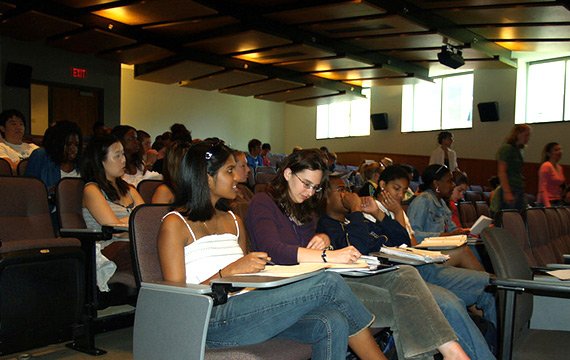Senior Comprehensive Examination

Senior Biology majors must satisfy the general College requirement of passing a comprehensive examination given by the major department (for honors students, the comprehensive exam is given by external examiners. In Biology, this comprehensive examination is the lecture series, Themes in Biology (Bio 097). Bio 097 features a series of visiting speakers, each of whom gives a presentation related to an overarching theme that can be addressed from all areas of biology - for example: timing, communication, extreme environments, aging, sex, foreign invaders of biological systems, etc. This lecture series enables faculty and students to interact on an intellectually challenging project that allows students to think about a topic at a variety of levels of biological organization and to have the opportunity to meet and interact with a variety of distinguished biologists.
Bio 097: Themes in Biology
Themes in Biology meets each week of the spring semester. Students who are completing their comprehensive exam must reserve the appropriate afternoon time period for the entire semester so that changes in scheduling, guest speakers or field trips can be easily accommodated. If a senior is given permission by the College to be away during the spring semester of the senior year, the Biology faculty may give permission to the student to write a senior paper and enroll in Biology 095, a Senior Project, to satisfy the College requirement for a comprehensive examination. Alternatively, the student may be given permission by the Biology faculty to enroll in Themes in Biology during the junior year if the student has planned in advance to be away during the spring semester of the senior year.
Prior to the first week of the semester, seniors will be divided into 3-to-4 person host teams. During the first week of class, the teams will meet to discuss and define the assigned topic.
Weekly Lectures
For the remainder of the semester, the weekly schedule will include a lecture by a visiting speaker followed by a general question session, a short break for refreshments and then a second meeting that includes the seniors, the speaker and the faculty host for a more in-depth question session based both on the lecture and the assigned papers. After this final session, a subgroup of students (the host team for that week), and the faculty host will take the speaker to dinner. There will also be an opportunity for students who are particularly interested in a specific guest or topic to meet with the speaker earlier in the day.
For each of the lectures in the fall, each team of seniors will meet in person to discuss the papers and write questions for the speaker. Each team will turn in the questions before the lecture for which they were prepared. These questions will go to the speaker and to the host faculty member. Each member of the group should also have a copy of the questions to bring to the discussion. Questions could be about techniques, experimental design, hypothesis formation, data analysis, conclusions about the data, connections to other areas of biology, etc., but they should demonstrate that students have read the assigned papers.
Each senior is required to attend each of the lectures and participate in the follow-up question sessions afterwards.
One time during the semester, each student will be part of the host team, which is responsible for opening and facilitating the post-seminar discussion. Following the discussion, the host team members will take the speaker to dinner with the host faculty member.
If a student has an unavoidable scheduling conflict with an invited lecture, that student is still required to meet with teammates to discuss the papers and to participate in writing ten questions for the invited speaker. Students unable to attend the speaker's lecture must also write a five-page paper discussing the assigned papers, the work of the speaker and how it relates to the overarching theme. This paper is due within two weeks after the missed lecture and should be turned in to the course coordinator.
Assessment
Students will receive a grade based on participation, evaluation of submitted questions and their performance on two short exams.
Students who fail Themes in Biology fail the comprehensive exam and, thus, can not graduate with a Biology major.



